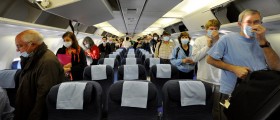
Swine flu is known in medical terms as the H1N1 strain of the influenza virus. The worldwide swine flu “pandemic” was officially declared to be over in 2010, but it is still important not to completely ignore swine flu. Swine flu will be circulating widely in the wintertime, so it is recommended to take the vaccinations that are on offer.
High Risk Groups
It is advised for those in high risk groups to take the vaccine. Those in the high risk group include pregnant women at all stages of pregnancy, as well as those who suffer from chronic lung, heart, kidney, liver or neurological disease (such as chronic fatigue syndrome, multiple sclerosis and Parkinson’s Disease.) Those who suffer from immunosuppression, diabetes or asthma might also be at increased risk. Elderly people are also at risk. Pregnant women are thought to be at increased risk of complications of H1N1. Symptoms of the virus are similar to other types of seasonal flu and most will recover within a week without treatment. If you are worried about swine flu, contact your doctor.
Symptoms
If one has suffered from high temperature (38C/100.4F +) and at least two of the following symptoms, you might be suffering from H1N1 flu. Symptoms include fatigue, headache, runny nose, sore throat, shortness of breath, lack of appetite, painful muscles, diarrhea and vomiting.
Should you experience these, flu-like, symptoms, you should try to remain at home, get plenty of rest and, if necessary, employ the usage of over the counter painkillers. Be sure to also consume a large amount of water, and if you are very concerned, or if you fall into the high risk category, be sure to consult your GP or doctor.
For most people, the above approach will work with regard to the treatment and controlling of the H1N1 virus. In the majority of cases, swine flu is a mild illness, from which it is easy to recover. However, as with all such illnesses, there will of course be those who will suffer from complications, either foreseen or unforeseen.
This is a mild condition, but it can have very serious consequences for the weak and the vulnerable. Treat the disease with respect. In the case that this disease does cause complications, there will most likely be other reasons for the development on the complications. Complications normally occur as a result of the virus affecting the lungs, in which case infections such as pneumonia can develop.

















Your thoughts on this
Loading...